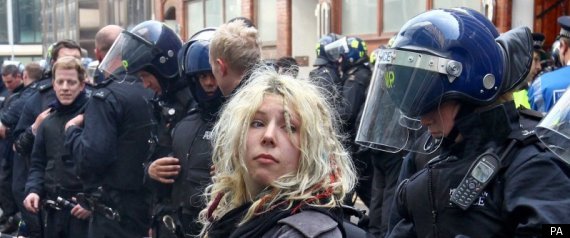 Anna is the model citizen. The 31-year-old self-described professional volunteer spends Mondays running a free bike workshop, Wednesdays counselling others in the community, and in her spare time is helping to build a community garden in Camberwell, South London.
Anna is the model citizen. The 31-year-old self-described professional volunteer spends Mondays running a free bike workshop, Wednesdays counselling others in the community, and in her spare time is helping to build a community garden in Camberwell, South London. For her it's about taking responsibility for where she lives. "If I didn't believe that what I spent most of my time doing made people's lives more pleasant, I'd be pretty lost. I'm hoping that I make life easier for others."
Among her projects: Free computing workshops, a shop set up to help young mothers who cannot afford their kids' back-to-school clothes, free skill-share workshops.
People like Anna are helping to make David Cameron's Big Society "vision" a reality. From free judo lessons to building adventure playgrounds or residents uniting to protect their libraries from the threat of closure, across London communities are uniting to help one another.
Just one thing… all these programmes are run by anarchist groups.
In a speech in February 2011 about the Big Society, David Cameron described the Big Society in a nutshell: "What this is all about is giving people more power and control to improve their lives and their communities."
But when he set out his vision he probably didn't have anarchists in mind. Dr Jo Haynes, a sociologist from Bristol University says the comparison is telling. "It's interesting that theoretically, a smaller state - or no state - chimes with anarchist principles as well, but the power taken by the people through anarchist community activity and political mobilisation would be at odds with the kind of 'soft power' envisaged within David Cameron's Big Society idea".
Jesse Norman disagrees. The Conservative MP, who has written a book on the Big Society, says while anarchists would be "absolutely appalled" to be considered at the vanguard of an idea which originated from the Conservative party, the two are are not so dissimilar.
"If you reach past the labels, it may be that as a matter of labels, anarchists are deeply uncomfortable with being concerned with any government programme... if you get away from the labels, an awful lot of what the Big Society is about is about restoring meaning and energy to people's lives. I think this is built into the idea that David Cameron’s talking about."
Dr David Chapman, a research analyst at the consultancy Monitor Group currently researching social entrepreneurs, believes Conservative advocates of the Big Society should look to anarchist groups.
"They have a pretty essential role to play within the Big Society agenda. Certainly within the middle-class Tory consciousness the word anarchist conjures up people in masks rioting. But that’s not what these people are doing, they are building communities. The point of social entrepreneurs, they are innovators, they don't do things in a normal way."
"To my mind an anarchist group in Dalston creating a community garden is exactly the same as some middle class parents in Oxfordshire trying to provide a free school. It's the community coming together.
"The only thing that differentiates an anarchist group from the kind of traditional Big Society perspective is the cultural perspective of who is an acceptable person."
But Dr Chapman says for the Big Society to work, everyone has to feel empowered.
"The Big Society is a very, very powerful idea but it does raise lots of questions about who, in a broad cultural sense, society deems as a valid individual."
And what do the anarchists think? Andy Meinke, Secretary of London-wide anarchist collective ALARM is scathing about the Big Society but recognises the comparison: "Obviously we regard Cameron's Big Society as an attempt to do social services on the cheap. The reality of the big society is creating a society that's not run for profit but for human need.
"That’s what we do in a very small way, we help people self-organise to help themselves in a way that the state won't do."
The prime minister has recognised the idea of the Big Society is not new. Many of these groups have been running for years. And they don’t want to talk to journalists. Volunteer-run anarchist bookshop 56a, who also help organise workshops and support fellow "community collectives” write: "we don't care about exposure, publicity or putting our side of the story etc… not interested",
Some are slightly more forthcoming: A community scheme for the unemployed in deal with the government all the time: "We are looking at people being moved from DSA [Disability Support Allowance] to JSA [Job Seekers' Allowance]", says trade union activist Marie "we want to help people".
As for Anna, she runs most of the skills workshops from the communal squat she lives in - an activity the government is currently consulting on making illegal.
"We're organising over 30 workshops and it's all free skill share. Welding, plumbing, electricity.
"The reason I came to London was to volunteer. There’s a severe lack of support for a lot of different people here –London has a really apparent rich-poor gap, and the people who are living below the poverty line are suffering. The Free Shop meant we could give kids' clothes to people who didn’t have enough."
So, what's the Big Society to her? "It sounds like a really right-wing concept."
Some names and places have been changed to protect identities
Origin
Source: Huffington
No comments:
Post a Comment